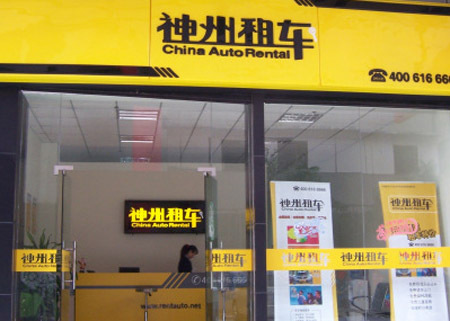China Auto Rental faces fraud allegations
- By He Shan
 0 Comment(s)
0 Comment(s) Print
Print E-mail China.org.cn, April 21, 2012
E-mail China.org.cn, April 21, 2012
|
|
|
A store of China Auto Rental. [File photo] |
China Auto Rental, China's leading auto rental firm, is facing allegations of fraud as it moves closer to its Nasdaq debut, scheduled for April 26.
The company announced that it reported its first-time quarterly profit since its founding in 2007, according to its latest statement filed with the US Securities Exchange Commission. It reported revenues of 366 million yuan (US$58.2 million) over the first quarter, an increase of 211.4 percent from a year ago, or 27.9 percent from the previous quarter. It lost 18.4 million yuan on a net profit of 5.3 million yuan. Also in the first quarter, its EBITDA (Earnings Before Interest, Taxes, Depreciation and Amortization) had risen by 349.5 percent year-on-year, or 57.7 percent compared to the previous quarter, up to 197.8 million yuan.
According to its previous prospectus, filed with the securities regulator, the company was drowning in the red for three consecutive years, from 2009 to 2011, as it lost 3.2 million yuan, 43.3 million yuan and 151.4 million yuan on revenues of 54 million yuan, coming to 143 million yuan and 775.8 million yuan respectively, over the three years.
What is noteworthy, is that the company has a high depreciation rate and shows a high spending on debt interests.
Industrial analysts said that the auto rental industry, as a type of public service, is liable to have big assets and high liabilities, and lack differentiation among competitors.
They said that even in the foreign auto rental market, which is mature, net profitability comes to no more than 5 percent. Chinese auto rental is still a fledgling industry, in which competitors rely heavily on low prices and advertisements to jostle for a market position. Most car rental firms happily enjoyed aggressive expansion but suffered great losses.
China Auto Rental has kept its rapid growth since it was founded in 2009. Its fleet grew from 692 units, at the end of 2009, to its current number of 28,930. But behind the boom was its equally rising debt. A large portion of its 2.5 billion yuan debt was backed by Legend Holdings. Its prospectus said that at the end of last year, the company's long-term loans, due this year, had amounted to 825 billion yuan.
Given its accelerated depreciation and high interests expenditure, questioning about the company's financial situation never ceased. Analysts commented that its EBITDA, which is still counted in interests and depreciation, is meaningless and cannot explain its profitability. Even more, some industrial analysts accused the company of embellishing its financial data to make its prospectus look better.
As a matter of fact, it was not the first time that the company faced questioning over its finances. Wu Bing, a professional investor with Go Capital, a Shanghai-based investment firm, openly doubted that the company's depreciation rate was too low. He said China Car Rental's depreciation rate for cars was between 39 percent and 45 percent from 2009 to 2011, equivalent to an annual rate of 13-15 percent, whereas the depreciation rate of its rival eHai Car Services, was 19 percent. Compared with the normal depreciation rate for a private car, 13 percent was a mind-boggling figure.
Moreover, Wu Bing questioned the company's low operating costs and high management costs. The analyst said that although the company failed to break its operating cost and management cost into details in the prospectus, details can be inferred based on relevant data. Over the first nine months of 2011, the company's management cost was 77.89 million yuan, averaging 120,000 yuan per person, a level much higher than the industry average and also much higher than its management cost during the first months of the previous year. Wu Bing suspected it was because that the company moved its partial operating cost into management cost. He also believed that other financial data, as claimed by the company, could not come out correct after an up-close investigation.
Despite of mounting doubts, China Auto Rental is still sticking to its IPO because of its financial difficulties. Its US listing, set for April 26, will sell at a price of US$10.5 to US$12.5, and is expected to raise about US$125 million.







Go to Forum >>0 Comment(s)